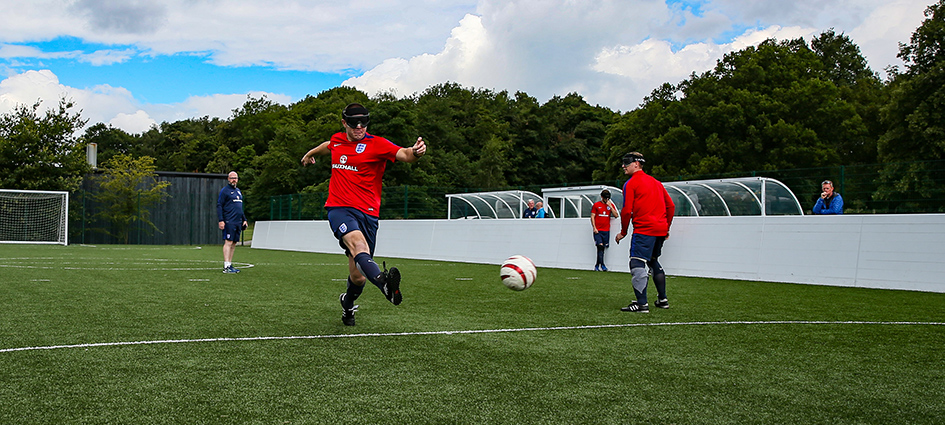England insight

Coaching blind footballers
- Keryn Seal and Dan English
- 30 October 2019
Former England blind footballer, Keryn Seal, and current national team captain, Dan English, tell The Boot Room about the importance of developing a bond of trust with their coaches.
In any healthy player-coach relationship trust is vitally important. For blind football players, however, it’s critical.From communicating tactical and technical information during training and matches to guiding the walk from the dressing room to pitch side, the bond between player and coach is pivotal.
Ex-England captain, Keryn Seal, and current Three Lions skipper, Dan English, state that having trust and understanding between the players and staff is important for the team.
“Coaches are working with athletes who are relying on hearing as their primary sense, so it’s important for them to understand how blind athletes move, how they learn, and how they adapt to different coaching feedback,” Seal explained.
“A lot of blind people haven’t actually moved sideways or backwards, for example. Before they come into football, they’re used to just moving forwards in a straight line, so the coach needs to help with that in terms of showing them how to move, not only in a sighted manner but a correct one.
“In our game it’s absolutely critical that any coach who coaches our game has some fundamental experience of working with blind people and blind athletes because this game is like no other in the 24 England squads,” added Seal.

English explained that coaches with first-hand experience of coaching blind football are better placed to support the varying learning challenges.
“We all learn differently. Some of us have had sight up until different ages, so we need things described in different ways,” he explained.
“A good coach is someone who understands the basics, who understands blind football and understands what you have got to do to let that player grow.
“Someone who has been blind from birth, for example, might not necessarily understand we’re playing in a triangle shape or a diamond shape, whereas a former sighted person would.
“So, this has to be broken down in different ways in training and it can be a little bit more of a technical session where we walk through different formations, types of run, things like that.”
Both Seal and English agree that establishing trust within the player-coach dynamic remains a gradual process reliant on the consistency and clarity of a coach’s methodology.
“That gradual rapport comes from being exposed to the coach's methods, the methods of the staff and trusting how they’re going to work.
“We trust and believe in each other as players, and as players to staff we trust and believe in the methods they’re employing.”
English agreed: “It’s not something that can come over night. It’s just something that has to be gradually introduced and grow as it goes along.
“For me I was quite lucky because I spent quite a lot of time with Jon Pugh [England head coach] and the assistant coach Adam Bendall at the RNC at Hereford blind college, training at the football academy and so I have built that trust up over time.”
Whilst much of the discussion focused on the coach’s role in sustaining the player-coach relationship, both Seal and English were keen to point out that the accountability isn’t solely one-sided.

English explained he and his England teammates often use a bit of friendly competition to ensure they keep up their end of the bargain.
“We’re generally good at doing what we have to do and what we’re told from the head coach because we know the outcome, and we know we haven’t got the time to not do the right things or let the session slip by.
“Away from camp, the boys motivate each other, and we have little competitions and little jokes to help keep each other going. I know it motivates me away from here because we’re all pushing, we all want the starting spot and we all want to be the fittest in the squad.
“Actually knowing someone else is training and you’re not can be a bit of a kick in the teeth.” Seal stressed that establishing trust should also be a shared ethic for both players and staff.
“It’s not just important with the head coach or the assistant coach, but rapport with all the staff is crucial,” he says. “You see coaches helping the players from A to B just around St. George’s Park, and that trust that someone is going to help you out, be it on the pitch, be it on the phone, or around St. George’s Park needs to exist throughout.
“Every one of the players has been well looked after through every member of the team, and so the trust at the moment is very strong.”
This article was first published in The Boot Room magazine in April 2015.


























